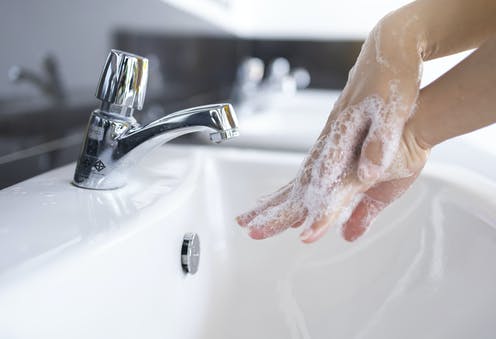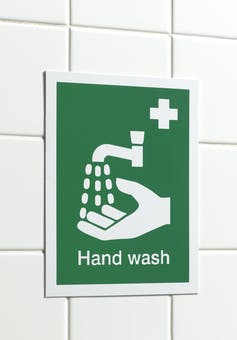
People were washing their hands so much early in the pandemic that sensitive skin and soap shortages were common problems in 2020.
All this focus on hand-washing was for good reason. The science uniformly demonstrates that frequent hand-washing reduces the risk of a variety of illnesses. It is low-hanging fruit in terms of an easy, healthy habit to practice.
However, people today aren’t washing their hands as often as at the beginning of the pandemic, and many are wondering: Should I still be washing my hands more often because of the coronavirus? The short answer is yes. That is because you probably weren’t washing your hands nearly as often as you should have been before the pandemic.
I am an epidemiologist and mom of three boys, one girl, two cats and one dog. Between sports and a busy household, there are a lot of opportunities for germs to spread in our house, coronavirus or no coronavirus.

Peter Dazeley/The Image Bank via Getty Images
Table of Contents
Hand-washing: How often?
You wash your hands after going to the bathroom, but when else should you be washing?
In general, germs can get on your hands in many ways – from dirty hands, droplets in the air released during a cough or sneeze, contaminated surfaces, or contact with a sick person’s body fluids. Your hands come into contact with thousands upon thousands of microorganisms each day – and that can be a problem considering that, on average, people touch their mouth, nose or eyes upward of 20 times per hour.
In hospitals, health care professionals are required to wash their hands before and after seeing every patient. While you and I might not need to do it quite as often, it’s always a good idea to wash your hands in warm or cold water with soap before eating, after using the bathroom, when coming inside from the outdoors and after any activity.
Before the pandemic, most people did not wash their hands enough. Men, in particular, were less likely than women to remember to wash their hands. In recent years prior to the pandemic, hand-washing hygiene had been slipping generally, both in terms of frequency of washing and duration as people are more often doing a simple rinse-and-run. One survey found that only around 40% of people reported washing their hands six or more times a day.

Alex Walker/Moment via Getty Images
Coronavirus transmission from touch
The SARS-CoV-2 virus is primarily spread through inhalation of infectious particles in the air. Catching the coronavirus from touching a surface – known as fomite transmission – is possible but is a low risk route of transmission, according to the Centers for Disease Control (CDC). This indirect transmission could happen if a person touched a contaminated surface, the coronavirus transferred to the person’s hand and then from their hand to their mouth, nose or eyes.
It is difficult to directly measure the risk of fomite transmission. Laboratory studies have demonstrated that the coronavirus can survive for hours and in some cases days on surfaces. However, other studies testing surfaces in real–world conditions – like a grocery store – did not detect the coronavirus. A research team estimated that the risk of infection from fomite transmission is less than 5 in 10,000 — significantly lower than risk estimates for infection through the airborne route and even lower than risk for influenza or norovirus.
But low risk is not no risk, and hand-washing has a direct, inverse association with illness. It has been shown to help prevent respiratory illnesses like colds, can reduce the spread of diarrhea and even helps to prevent children from missing school due to gastrointestinal illness.
The more you wash, the less likely you will have germs on your hands that can make you sick. This applies to the coronavirus as much as any other pathogen.

Solarseven/iStock via Getty Images
When in doubt, wash
The CDC and public health experts often repeat that the first line of defense against the spread of the coronavirus is hand-washing with soap and water for at least 20 seconds.
In 2020, a survey by the CDC found that the chances a person washed their hands before doing certain things nearly doubled compared to 2019. But even so, people still weren’t washing their hands every time they should, pandemic or not. And despite this early increase, there is evidence that as coronavirus cases are dropping, hand-washing hygiene is falling too, even among health care professionals.
So how often should you wash your hands? The simple answer is every time you need to.
Use soap. Wash for 20 seconds at least – roughly one round of singing Happy Birthday. And remember to air dry or towel dry your hands because wet hands are also a good vector for transferring germs.
The science is clear that the commonplace practice of hand-washing is one of the most important activities that a person can do to avoid getting sick or spreading germs to other people. You probably weren’t doing it enough pre-pandemic, and there has never been a better time to improve your hand-washing hygiene, especially as the holiday season approaches.
[Over 110,000 readers rely on The Conversation’s newsletter to understand the world. Sign up today.]
![]()
Melissa Hawkins receives funding from USDA and the Luce Foundation.
























